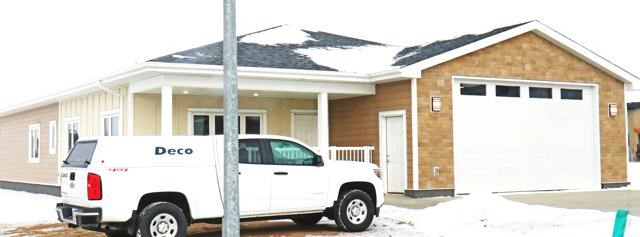The Weyburn Group Homes Society is continuing to meet the needs of their participants with a new group home soon to open in the city, and thus far they have stayed safe in the COVID-19 pandemic.
Colin Folk, executive director of the Group Homes Society, gave an update on their growth and activities to the Weyburn Rotary Club via a Zoom meeting on Thursday.
In the two years since he last spoke to the club, Weyburn Group Homes had a new group home built for them in The Creeks, and the turn-over of the home to the organization will be on April 1.
Folk said they are very grateful for this home, as it was built brand new for their needs, rather than having the ministry buy an existing home and renovating it.
This will be the seventh group home for the organization, which is now taking care of 77 clients with around 115 employees on the payroll, Folk explained, making them one of Weyburn’s largest employers.
“Right now there’s a need for services in Weyburn, Estevan, Carlyle, Redvers and Midale. It’s an emerging need not only for those with intellectual disabilities, but also people with mental health issues. We are in a very busy field,” said Folk.
They have been able to keep COVID-free to this point, he noted, but this is largely due to being pro-active, by developing a comprehensive pandemic plan and training all of the employees in the proper use of masks, gloves, gowns and face shields, including the protocols for hand-washing and sanitizing, and taking on and off of the PPE equipment.
One of the biggest needs for the Group Home Society is keeping up their fleet of vehicles, in particular the ongoing maintenance of the vehicles needed to transport their clients around the city or to work at places like the Weyburn Wor-Kin Shop.
Folk noted they have nine vehicles currently which cost an average of $11,000 a year just to register them, and ongoing maintenance of around $8-900 per vehicle per year, not to mention bills when something major goes wrong, such as one of the wheelchair lifts.
Weyburn Group Homes operates two paratransit buses each capable of transporting six wheelchairs, and when one of the lifts needs fixing, that can cost upwards of $2,000, said Folk.
They just closed a deal for a 2014 mini-van that Folk is picking up today, Feb. 3, and this will given them four operating mini-vans between the seven group homes. His long-range goal is for every group home to have their own mini-van.
From meetings the agency has with other organizations and with government ministries, they are aware of 15 people in the southeast on a waiting list for a group home, plus another 19 who are under the age of 18, and will eventually be needing an organization like Group Homes to help care for them, Folk explained.
At the new group home, one of the features Folk is very happy about is a Jacuzzi tub that will allow a participant to be rolled in on a wheelchair suitable for water use, and to have a bath, without the need to be placed in a harness to be lifted in and lifted out again.
Four of the homes will be wheelchair-accessible once this home opens, and Folk expressed the wish that all seven group homes were wheelchair accessible.
Folk’s office is located at Dominic’s Place, the former St. Dominic Savio School (where he attended school), and he spoke of the services this unique facility offers.
This project started in 2016, and it provides acute psychiatric care for those who are in recovery from mental illness or addictions. Each patient who lives there has a plan under the supervision of a psychiatric nurse, and Folk added, “It’s been full since it opened. The needs in southeast Saskatchewan have been through the roof.”
He noted that Estevan’s new detox centre has been at capacity, as are facilities in Moose Jaw and Prince Albert.
Asked how the staff have been dealing with COVID, Folk noted they developed the pandemic plan as “a living working document” that was developed with the guidance of the Saskatchewan Health Authority.
The plan was developed when word came down on March 19 last year of the lockdown the province was put into, adding, “that date is burned into my head as our lives were changed then for all of us.”
The value of the plan became evident when word came of the outbreak first at the Weyburn Special Care Home and then the Weyburn General Hospital, and they had to adjust how their staff worked. Staff were set to work at only one facility to prevent any cross-contamination, and some of their casual employees ended up going to work with the Sask. Health Authority, some getting more full-time hours as a result.
For the clients of the group homes, it’s been difficult as events like hockey games, the theatre and bowling alley are all gone or are shut down, and the clients have been urged not to be visiting at home or with their friends.
They have begun doing activities like taking walks on the Tatagwa Parkway trails, and doing dog-walking.
“We have clients who will go to your house and they’ll take your dog for a walk while you’re at work. This will continue even after COVID, because our clients just love it,” said Folk.




